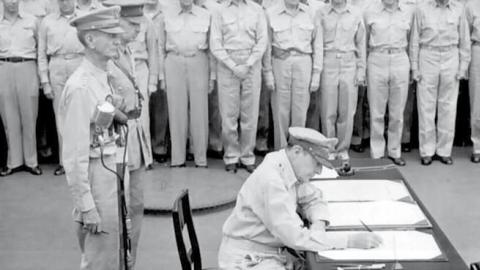Seventy-five years ago, the greatest conflagration in world history was finally snuffed out. After seeing two of his cities destroyed by atomic bombs, Emperor Hirohito announced over the radio to his people that Japan would surrender. A wave of nearly riotous celebration broke out across the United States and other Allied nations. In London and New York, office workers threw ticker tape and papers out their windows to shower passersby with impromptu confetti, and Life magazine’s Alfred Eisenstaedt took an iconic — and now controversial — picture of a sailor kissing a nurse amid the revelry in Times Square.
That image is often seen as an emblem of how Americans felt at the end of the war. The traditional narrative holds that the United States was invigorated and confident, the master of the world after vanquishing the Nazis and nuking imperial Japan into submission. After the Japanese surrendered and ended the most destructive war in history, Americans wisely stepped into the global leadership role that they had shirked after World War I.
Most of that narrative is untrue, and understanding the war’s aftermath can give Americans valuable insights into the crisis brought by coronavirus. Although most Americans were happy that the war was over, many felt acute anxiety about how the economy would respond to the war’s end. Nearly 10 million Americans had been drafted into the armed forces, and they were desperate to get home and scoop up any jobs that were available before they disappeared: They all remembered the Great Depression, and unemployment rates were in the double digits in 1941 before the draft began in earnest. No one could say with confidence whether the private economy would pick up the slack as military spending nosedived, and the GIs wanted to find work before the jobs ran out. GIs overseas began lobbying their congressmen and protesting how slowly they were being discharged, and the secretary of war was burned in effigy in Guam.
They were not the only ones eager to bring the boys back. Harold Ickes, one of the major architects of the New Deal, warned that the nation’s coal mines were short of manpower. Unless the Army discharged 30,000 miners, he said, so they could return to work, the U.S. economy would freeze up and Europe’s recovery would grind to a halt. The Army, which did not want to set off a lobbying frenzy for favored constituencies to be discharged, dug in its heels and infuriated Congress and the executive branch.
Meanwhile, at home, industrial workers wanted wage increases after they had avoided strikes for years to help the war effort. In November 1945, the UAW launched a nationwide strike of hundreds of thousands of workers against GM and kicked off a wave of national strikes that continued throughout 1946. Over that year, more than 5 million workers went on strike for wage increases they felt were due after years without labor agitation. They had a point: As wartime price controls and rationing were relaxed, inflation jumped into double digits. It is no wonder that the stock market lost nearly a quarter of its value in a bear market that lasted from May to October 1946. Unsurprisingly, the Republicans swept the Democrats out of the House and Senate in the 1946 midterm elections.
Amid this domestic turmoil, the last thing most Americans wanted was to take on additional global responsibilities. Some hoped that the Soviet Union and United States would maintain the wartime alliance and thus avoid conflict, others that the United Kingdom would balance against the Soviets in Europe, still others that all countries would work out their disputes peacefully in the new United Nations. It was only with great difficulty that the Truman administration accepted the new American role in the world and then persuaded the American people to support an anti-Soviet foreign policy.
In part because of political pressure, the U.S. military shrank rapidly and nearly fell apart during the drawdown. The Truman administration had estimated that it needed a 2.5-million-man Army after the war but was down to less than half of that by June 1947, and American soldiers would pay in blood a few years later in Korea for the military’s chaotic decline. George Marshall later recalled,,+when+I+was+Secretary+of+State+I+was+beingpressed+constantly,+particularly+when+in+Moscow,+by+radio+messageafter+radio+message+to+give+the+Russians+hell+....+When+Igot+back,+I+was+getting+the+same+appeal+in+relation+to+the+FarEast+and+China.+At+that+time,+my+facilities+for+giving+themhell-and+I+am+a+soldier+and+know+something+about+the+abilityto+give+hell-was&source=bl&ots=cmedhrsD8C&sig=ACfU3U3gm26Hx6D_7K0e5DlMpnJMUn7Rbg&hl=en&sa=X&ved=2ahUKEwjk-fCO6pPrAhXMmHIEHUGtBGcQ6AEwAHoECAoQAQ#v=onepage&q=when%20I%20was%20Secretary%20of%20State%20I%20was%20being%20pressed%20constantly%2C%20particularly%20when%20in%20Moscow%2C%20by%20radio%20message%20after%20radio%20message%20to%20give%20the%20Russians%20hell%20&f=false “When I was secretary of state, I was being pressed constantly, particularly when in Moscow, by radio message after radio message to give the Russians hell. . . . That is quite a proposition when you deal with somebody with over 260 [effective combat divisions] and you have one and a third.”
Although the coronavirus is not nearly as devastating as the World War II, the United States is currently facing economic problems that surpass the ones of 1945 and 1946, and the voting public today is just as weary of foreign entanglements as people were then. But just as there was no international body or group of allies able to manage international affairs without the U.S. after World War II, there is no better option for the U.S. than to remain engaged abroad.
In this crisis, it is natural to prefer to focus on America’s domestic problems and inevitable that many will want the rest of the world to take care of itself when the U.S. faces hard times at home. But they should take care: If we turn our back on the outside world to get our house in order, we’re not going to like what we see when we’re ready again to look out the window.
Read in National Review



















